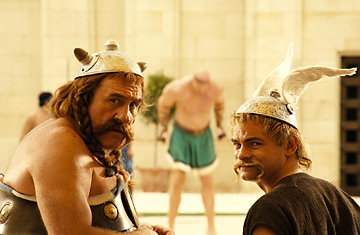
A scene from Asterix at the Olympic Games, the most expensive French film ever made.
It's the most expensive French film ever, with a massive release on 6,000 screens across Europe. It stars French cinema royalty Alain Delon and Gérard Depardieu as well as sports icons like soccer god Zinédine Zidane, basketball wizard Tony Parker and motor-racing legend Michael Schumacher. But the undisputed star of the show is the feisty, moustachioed comic strip hero upon whose adventures the movie is based: Asterix.
A Gallic national treasure, Asterix is revered and adored by the French far more than even Mickey Mouse is by Americans. Everyone knows that he lives in ancient Gaul, in a remote village on the Brittany coast surrounded — but never conquered — by the mighty Roman Empire. Asterix and his fellow Gauls were invented in 1959 when a new comic magazine, Pilote, commissioned René Goscinny and Albert Uderzo to create French characters able to resist the invasion of American comic strips.
On Wednesday, nearly 50 years on from the comic's debut, the third live action adaptation of his adventures was released, in an extravagant promotional blaze that would have even made Hollywood sit up and pay attention. The movie, Asterix at the Olympic Games, comes just six months before the Beijing Games, which the marketing campaign gleefully exploits.
The film is based on the 1968 comic book of the same name, which was the 12th in the series of 33 about Asterix and his portly friend Obelix, who travel to Olympia in Greece to compete in the games.
Director Thomas Langmann — who co-helmed the movie with fellow Frenchman Frédéric Forestier — told the daily Le Parisien that the challenge this time is to "compete with American cinema, without betraying our own identity". To broaden the appeal, he also cast stars from across Europe, like Spaniard Santiago Segura, Germany's Michael Herbig, as well as Australian wrestling colossus Nathan Jones. "We could either have aimed to target 60 million viewers in France alone, or 300 million potential viewers throughout Europe. I decided to go for the second option," Langmann said.
Critics, however, have been skeptical about the results. "The film has been made for audiences ranging from the Spanish coast to the Urals, passing through the Acropolis," wrote La Croix. "The result is a flat dialogue, jokes which are barely funny and a sluggish pace." Le Monde described it as a "vacuous gigantic stewpot," L'Express called it "French cinema's first bling-bling film," while Libération said it was a "tragic potion."
Their complaints are unlikely to dim the movie's prospects. The reviews were similarly scathing back in 1998 for the first Asterix film — Asterix and Obelix versus Caesar, which sold 25 million tickets, 15 million of them overseas, and only slightly better for 2002's Asterix and Obelix: Mission Cleopatra, which did almost as well. Asterix has a massive fan base to draw upon: the comic books have sold 330 million copies in over 100 languages. While France likes to boast of its high-brow credentials, Asterix books easily outsell those of worthy rivals Proust, Sartre and Balzac.
So ingrained is Asterix in French culture that many French people now mistakenly pronounce the word asterisk ('asterisque') as asterix. His success spawned an Asterix theme park outside Paris in 1988: it manages to compete honorably against Disneyland Paris, although it has a fraction of the resources of its American rival. And while the U.S. has remained immune to the Gaul's charms, his celebrity has already been recognized by one venerable American publication: Asterix was the cover star for a TIME magazine special edition on "The New France" in 1991.
Even today, Asterix stories seem to chime with the country's discomfort with globalization as it rails at the hegemonic power of the day, be it Roman imperialism or Anglo-Saxon capitalism. Commentators refer to France's 'Asterix syndrome', a tendency to withdraw from the rest of the world, yet rejoice in splendid isolation.
The latest movie rekindles Asterix's eternal battle against Julius Caesar, again feeding on France's sense of cultural independence. Ironically, Asterix himself has become a new empire, and one that easily rivals ancient Rome. He leaves nothing unbeaten but the hegemons of Hollywood.
